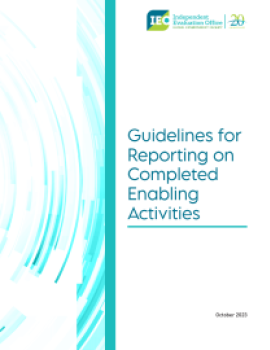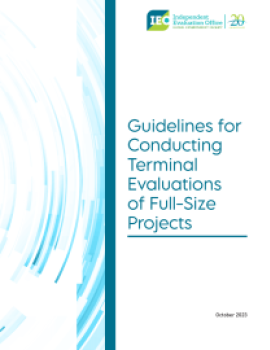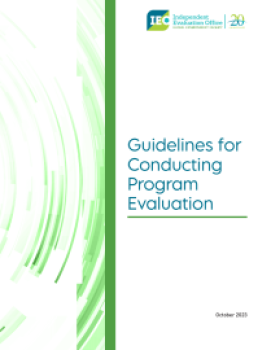The GEF Independent Evaluation Office (IEO) is introducing new evaluation guidelines that will redefine how program and project evaluations are conducted. Effective January 1, 2024, these comprehensive guidelines encompass GEF-funded programs, full-sized projects, and enabling activities. The primary objective of these guidelines is to empower the GEF community to conduct thorough program and project evaluations, ensuring uniformity and completeness in reporting. The IEO worked closely with the GEF Secretariat and GEF Agencies to develop these guidelines, signifying a collaborative effort to enhance evaluation practices.
Guidelines for Conducting Terminal Evaluations of Full‑Size Projects is an essential update to the previous 2017 guidelines. This revision became necessary to align with evolving GEF modalities, policies, and global good practices. These guidelines offer a more in-depth approach to evaluate child projects within programmatic frameworks, providing clearer insights into aspects such as theory of change, additionality, coherence, integration, and environmental and social safeguards. Notably, coherence now stands as a distinct evaluation criterion, in line with the OECD DAC's Better Criteria for Better Evaluation (2019).
Guidelines for Reporting on Completed Enabling Activities (2023) is a novel addition to our toolkit. Enabling activities represent a substantial 25 percent of all GEF projects and 4 percent of total GEF funding. However, consistent reporting on the completion of these activities has been lacking. These guidelines aim to ensure comprehensive reporting on the delivery of intended outputs and the responsible use of GEF funds. Furthermore, they encourage GEF Agencies to adopt a streamlined approach commensurate with the level of funding involved.
Although GEF Agencies are required to submit a terminal evaluation for completed medium-size projects, the GEF IEO has not issued separate guidelines for this modality. The Agencies are encouraged to use the guidelines for full-size projects as an inspiration for preparing terminal evaluations for medium-size projects. However, the Agencies also have the flexibility to prepare a more streamlined report commensurate with the size of the GEF funding.
Guidelines for Conducting Program Evaluation (2023) is a key resource for evaluating GEF-supported programs. Programmatic approaches have grown in importance in GEF support, yet, historically, program evaluations have received less attention than child projects. These guidelines bring these program evaluations into focus. They incorporate the concept of coherence as a separate criterion and shift from a four-point to a more nuanced six-point scale to assess sustainability. These changes aim to align program evaluation guidelines with those of full-sized projects.
You can find these updated guidelines on the GEF IEO website. To ensure their practical use by GEF Agencies, the IEO will also conduct workshops and webinars in the upcoming months.



